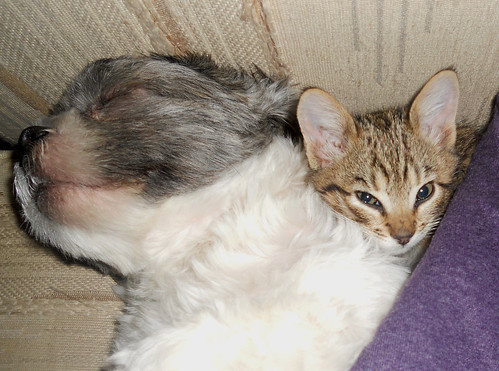 by Lyn Lomasi, Staff Writer I can’t even remember exactly which of us started it. But my kids and I have taught the dogs their commands in multiple languages. We like to learn and use multiple languages in our household. Since we do it, the pets should be no different. They’re a part of the family, too. The first one we tried was the sit command in French. The dogs had that one down in less than a day. The Shih Tzu seems to prefer the French commands most now, actually. Since one of our dogs may have some black German Shepherd in her and my oldest teen had started learning German at the time, we thought it would be fun to try some German, too. So that was the second language we tried. Surprisingly (well not so surprising to us anymore – animals are smarter than some think), they catch on to each new word from each new language quite quickly. So far, the dogs know commands in English, French, and German. Since they are doing such a great job, we may add more at a later date. UPDATE: We’ve since added Spanish and they took to it quickly. Since we rescued our fur babies from shelters, it is unknown whether they were taught other languages prior to being with us. However, they sure did pick them up quickly, regardless. A few hints if you wish to try this with your dogs: 1.Only use languages in which you know how to correctly pronounce the words. There is no point in teaching it incorrectly and it will defeat the purpose if your dog ever has the opportunity to interact with someone else who speaks that language. 2.Use a reward system. Food usually works best, such as a favorite treat. However, some dogs would rather perform for a special toy, praise, or even for both food and praise. You know your furry friend best. Choose accordingly. 3.Use proper hand signals or dog sign language when giving each command in any language. This helps the dog learn faster and also adds another language at the same time (sign language). 4.Don’t force it. Not every trick or command is right for every dog. Give your dog breaks while learning and if the learning is not working or your dog is upset, don’t continue. Stressing out your dog will not help the learning process. However, it may hinder it and make it harder to teach or even be considered abusive. If your dog is not happy at any point, stop. *Image Credit/Copyright: Lyn Lomasi (Bo-Bo the Shih Tzu performing tricks for treats) **I originally published this on Bubblews.com (no longer published there).
0 Comments
 by Lyn Lomasi, Write W.A.V.E. Media Staff Grooming a dog with allergies can be different from grooming other dogs. Our Shih Tzu has asthma and allergies. So we’ve had to treat his grooming process different from some other dogs we’ve groomed in the past. Shih Tzu dogs are double-coated. Although they are on the least allergenic list for humans, they’re also more likely to have allergies themselves than some other breeds. When it comes to Shih Tzu dogs with allergies, it’s better to be safe than sorry. While these grooming practices may not prevent all allergy outbreaks, it has helped our Shih Tzu’s allergies considerably. Keep Your Shih Tzu’s Fur Short Because Shih Tzu dogs have a good amount of fur, they may need to be groomed often. Keeping the hair around their eyes and nose very short can help prevent drainage from both areas. Runny eyes and runny noses may be further irritated when the fur is brushing up against them or building up dander near them. Speaking of dander, keep other areas that touch the body as short as possible, as well. While this does not always take away dander problems and itchy skin, it can help to reduce build-up and make it easier to apply any skin treatments your vet might prescribe. Use Scissors Instead of Electric Clippers Because dogs with allergies can be sensitive to fur, dust, and dander, scissors are generally a better idea than electric clippers. The clippers can sometimes cause allergens to fly around in the air more than the scissors will. The electric clippers also might contain residue from being oiled. This can cause an allergic reaction in some dogs. The clippers themselves also might be too harsh on sensitive skin. Scissors are generally easier to keep disinfected as well. Some dogs also might break out when they are nervous. The loud noise emitting from the electric clippers may cause such a reaction. Use Allergen Free Shampoo When bathing your dog, be cautious of the ingredients in the cleansing products. Stay away from fragrances, dyes, and other harsh chemicals that may irritate your Shih Tzu dog’s allergies. Look for brands specifically made for dogs with allergies. However, avoid those that are still scented, as these can still irritate your dog’s skin, nose, and eyes. Medicated shampoos made for skin allergies can be good, as long as there are no dyes, perfumes, or other strong chemicals. Simple solutions with ingredients you can understand are often the best. Bathe or Clean Sensitive Areas After Outings Whenever your Shih Tzu dog is outdoors or in areas away from home, be sure to clean sensitive areas. Bathe your dog when outdoors time is prolonged or your dog is exposed to irritants, such as excessive dirt, trees, plants, grass, pollen, fungus, anything that makes your dog dirty, and other known allergens. Pay special attention to the face, especially the eyes and nose. But keep your dog’s fur as irritant free as possible. Fragrance free dog wipes or a wet cloth with hypoallergenic dog shampoo can be handy for this task. Avoid Finishing, Whitening, and Other Fur Sprays Many Shih Tzu dogs have areas of the fur that are white. Because of this, some pet parents will reach for whiteners and other spray fresheners to keep those areas extra shiny and clean looking. But when your Shih Tzu has allergies, this can be a very bad idea. These sprays often contain harsh chemicals and fragrances that can cause an allergic reaction. The same is true for detanglers, dog deodorant sprays, pheromone sprays, calming sprays, and any other product that is sprayed onto the dog’s fur. *Please keep in mind that the author is not a licensed veterinarian. Please speak with your veterinarian about these and other safe grooming tips to ensure that your dog has the best plan to fit his or her personalized needs. **I originally published this elsewhere (since removed). RELATED: Oh My, I'm Grooming the Shih Tzu Myself! by Lyn Lomasi, Write W.A.V.E. Media Staff
You may like the booming and flashing and excitement on the Fourth of July. However, for a pet, some of those sights and sounds can be terrifying and have life-threatening consequences. Help keep your pet safe, calm, and happy on July 4th by following important pet safety tips.
Give your pet extra exercise before the loudest time Dog parents can take their furry friend on an extended walk before the festivities begin. This helps ensure there will be very little chance of potty breaks during the noisiest times. It also will keep your pet more relaxed because he or she will be ready to sleep, instead of play. For other pets, provide their normal exercise routine for a longer period of time. For instance, have your cat play with kitty toys, put small animals in their exercise ball, or take your horse for a long run/ride. Keep your pet indoors as much as possible Dogs may need to go out to use the bathroom. But try to avoid taking your animals outside, especially during the loudest times. You might even consider using training pads instead of taking your pet outdoors for bathroom breaks. Many animals get lost during the Independence Day festivities because they run away, scared of the noises, looking for a safe place to hide. To avoid problems with your pet getting frightened or running away, please keep them inside. Keep your pet's ID tags on at all times Your pet's ID tags should be securely placed on the collar and up to date at all times. This is especially important on a day when it's more likely for him or her to run off. Even if your pet is micro-chipped, some people don't know to take them to get scanned. The ID tag is one more measure of safety -- and an important one if someone finds your pet. The phone number and address should always be accurate, so that your pet has a better recovery chance if lost. Keep your pet in the quietest place of your home Whichever room takes in the least noise from outdoors would be the best room to house your pet in during the Fourth of July celebration. Close all windows and doors and keep your pet's supplies in there, such as fresh food, water, favorite toys, and a litter box or puppy pads. Give your pet a busy toy For dogs, a chew toy or bone may keep them so busy, that it distracts them from the noise. Cats like catnip and things they can chase or bob around, such as toys that are attached to a heavy object. Small animals, like rats or guinea pigs may like flavored chew sticks made especially for them. Play soothing music Not only will music help to drown out the outdoor noise, but if you choose the right sounds, it can also keep your pet calm. Just like people, animals respond well to various types of music and can find it comforting and a source of pleasure. You may want to test out different sounds beforehand to ensure you've made selections your pet will respond favorably to. Give your pet some love This is hopefully obvious. But when pets are stressed -- and even when they aren't, they want lots of love from their human families. There's nothing more comforting and reassuring than a hug and soothing words from someone you love. You may need to give extra attention to your pets, especially on this day. Happy Fourth! Stay safe! |
Pawsitive
|
- Brand Shamans
- Brand Healing
- Inner Healing
-
INTENT-SIVE NATURE
- Content & Brand Elevation
- Healing Jewelry & Talismans
- Bath, Beauty, & Self-Care
- Healing Sessions
- Rituals, Herbs, & Altar Supplies
- Gawwwdess Baby Boutique
- Soul Flame Gifts
- Yoga & Meditation
- Books & Media
- Education & Homeschool Resources
- Home, RV, & Decor
- Clothing
- Pets
- Custom Orders
- Monthly Subscription Boxes
- October Festivals
- FLOW-Key Parenting
- About & Contact
- RV, Nature, & Travel Shamans
- Souls Within
- Life & Home
- Heart 'N Mind Homeschool
- The Homeschooling Mommy
- Books & Authors
- Speak Up!
- Pawsitive Pet Parenting
- Manifesterz
- Gifts In Minutes
- Brand Shamans
- Brand Healing
- Inner Healing
-
INTENT-SIVE NATURE
- Content & Brand Elevation
- Healing Jewelry & Talismans
- Bath, Beauty, & Self-Care
- Healing Sessions
- Rituals, Herbs, & Altar Supplies
- Gawwwdess Baby Boutique
- Soul Flame Gifts
- Yoga & Meditation
- Books & Media
- Education & Homeschool Resources
- Home, RV, & Decor
- Clothing
- Pets
- Custom Orders
- Monthly Subscription Boxes
- October Festivals
- FLOW-Key Parenting
- About & Contact
- RV, Nature, & Travel Shamans
- Souls Within
- Life & Home
- Heart 'N Mind Homeschool
- The Homeschooling Mommy
- Books & Authors
- Speak Up!
- Pawsitive Pet Parenting
- Manifesterz
- Gifts In Minutes


 RSS Feed
RSS Feed



